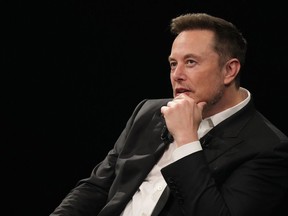Article content
Elon Musk, speaking at a conference in Paris, said that he bought Twitter Inc. because the social network was having a “corrosive effect” on civil society that he hoped to improve.
Still, he quipped about his US$44-billion purchase: ‘If I’m so smart, why did I pay so much for Twitter?’

Elon Musk, speaking at a conference in Paris, said that he bought Twitter Inc. because the social network was having a “corrosive effect” on civil society that he hoped to improve.
Story continues below
“My hope was to change that and have it be positive for civilization,” he said as part of a wide-ranging discussion at the VivaTech conference on Friday in front of a crowd of about 4,000 people. Musk said he believed that most regular users of Twitter would say that their experience on the site has improved.
Musk also expressed optimism about new chief executive Linda Yaccarino’s ability to court advertisers. Use of the network is at an all-time high and that “almost all the advertisers have said they have either come back, or they will come back,” he said.
When Musk took over, advertisers began fleeing Twitter because they were concerned about the type of content their ads would appear next to. Since October, Twitter’s advertising revenue has declined by 50 per cent, Musk said in March. Twitter recently lost two executives in charge of making sure the site was moderated for violence, hate speech, pornography and other content that businesses are hesitant to promote their products alongside.
Story continues below
Musk hired Yaccarino, a former NBCUniversal ad executive, to improve the company’s relationship with brands. He said she’d do “great job” handling “advertisers’ concerns” about posting ads on the social network.
Still, he quipped about his US$44-billion purchase: “If I’m so smart, why did I pay so much for Twitter?”
Musk, who was interviewed on stage by ad industry veteran and Publicis Groupe SA Chairman Maurice Levy, also used the platform to repeat his concerns about the dangers of letting artificial intelligence develop unchecked.
If I’m so smart, why did I pay so much for Twitter?
Elon Musk
“There is a great danger for digital superintelligence having negative consequences,” the billionaire said. “If we are not careful with creating artificial general intelligence, we could have potentially a catastrophic outcome.”
Story continues below
While the results of the technology, that he called the “most disruptive ever,” could also be positive, he stressed that there is “a risk to the public for sure,” and the technology should be regulated.
Musk also predicted his Neuralink Corp. would carry out its first human implant later this year. Last month, Neuralink said it received approval from the United States Food and Drug Administration to conduct human clinical trials. Calling progress “slow,” Musk said the aim is to restore full-body use to a person who has lost it.
Earlier on Friday, he had lunch with Bernard Arnault, the French billionaire who temporarily surpassed Musk to become the world’s richest person. Musk recently reclaimed his title from the CEO and controlling shareholder of LVMH Moet Hennessy Louis Vuitton SE after investors sold luxury stocks.



Musk also met with French president Emmanuel Macron, who has lobbied Musk to build a factory in the country. Macron said before the meeting that he wanted to discuss AI, social media and the regulatory framework for social networks.
—With assistance from Sarah Frier.
Comments
Postmedia is committed to maintaining a lively but civil forum for discussion and encourage all readers to share their views on our articles. Comments may take up to an hour for moderation before appearing on the site. We ask you to keep your comments relevant and respectful. We have enabled email notifications—you will now receive an email if you receive a reply to your comment, there is an update to a comment thread you follow or if a user you follow comments. Visit our Community Guidelines for more information and details on how to adjust your email settings.
Join the Conversation